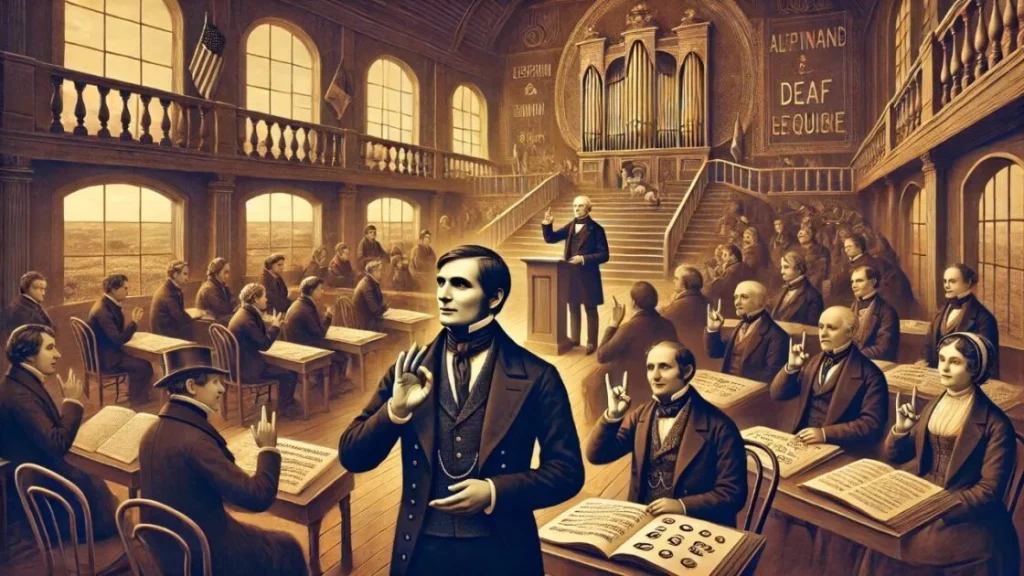Early Life and Education
Ferdinand Berthier was born into a world where opportunities for deaf individuals were scarce. His early years were shaped by the challenges that many deaf individuals faced during the 19th century—a time when society’s understanding of deafness was limited, and educational opportunities were nearly nonexistent. However, Berthier’s life took a transformative turn when he was enrolled at the Institut National des Jeunes Sourds de Paris, the first public school for the deaf in the world.
Under the tutelage of the renowned Abbé Sicard and his successor, Jean Massieu, Berthier thrived in an environment that encouraged the use of sign language and promoted deaf education. His academic brilliance soon became evident, and he quickly distinguished himself as a scholar and advocate.
Championing Deaf Rights
Berthier’s time at the Institut was not just a period of learning; it was the beginning of a lifelong commitment to advocating for the rights of the deaf. He was one of the first deaf educators to take a stand against the prevailing oralism movement, which sought to prioritize speech and lip-reading over sign language. Berthier understood that sign language was not just a mode of communication but a cultural cornerstone for the deaf community.
In 1830, Berthier became a professor at the Institut National des Jeunes Sourds, where he dedicated his life to teaching and advocating for deaf education. His commitment to promoting sign language as a legitimate language was unwavering, and he worked tirelessly to ensure that deaf students received a quality education that respected their linguistic and cultural identity.
The Establishment of Deaf Associations
One of Berthier’s most significant contributions was the establishment of the first organized associations for the deaf. In 1834, he founded the Société Centrale des Sourds-Muets de Paris (Central Society of the Deaf-Mutes of Paris), which provided a platform for deaf individuals to come together, share their experiences, and advocate for their rights. This organization laid the groundwork for future deaf associations worldwide and is considered a precursor to modern-day deaf advocacy groups.
Berthier’s efforts were instrumental in fostering a sense of community among deaf individuals, empowering them to take an active role in their own advocacy. Through these associations, Berthier also worked to promote the use of sign language and to challenge the negative stereotypes and misconceptions that society held about deaf people.
Recognition and Honors
Ferdinand Berthier’s contributions to the deaf community did not go unnoticed. In 1849, he was awarded the prestigious Légion d’Honneur, becoming the first deaf person to receive this honor. This recognition was not just a personal achievement for Berthier but a milestone for the entire deaf community, as it highlighted the importance of their contributions to society.
Berthier continued his work as an educator, advocate, and historian, documenting the history of deaf education and the achievements of deaf individuals. His writings provided valuable insights into the deaf community’s struggles and triumphs, ensuring that their stories were preserved for future generations.
Legacy and Impact
Ferdinand Berthier passed away on July 12, 1886, but his legacy lives on. His work laid the foundation for modern deaf education and advocacy, and his influence can still be felt in the deaf community today. Berthier’s commitment to promoting sign language and fighting for the rights of deaf individuals has inspired countless others to continue the fight for equality and recognition.
Berthier’s life is a testament to the power of perseverance and advocacy. In a world that often overlooked the needs and rights of the deaf community, Berthier stood tall, using his voice—though silent—to advocate for a future where deaf individuals could thrive without barriers.
Conclusion
Ferdinand Berthier’s impact on the deaf community is immeasurable. His work as an educator, advocate, and historian helped shape the course of deaf education and laid the groundwork for the rights and recognition that deaf individuals enjoy today. Berthier’s life serves as a reminder of the importance of advocacy and the enduring power of community.
FAQs
- Who was Ferdinand Berthier? Ferdinand Berthier was a 19th-century French educator, historian, and advocate for the deaf community, known for his efforts to promote sign language and establish deaf rights.
- What is Ferdinand Berthier famous for? Berthier is famous for being one of the first deaf educators to champion sign language and for founding the first organized associations for the deaf, which played a crucial role in deaf advocacy.
- How did Berthier contribute to deaf education? Berthier contributed to deaf education by teaching at the Institut National des Jeunes Sourds de Paris and advocating for the use of sign language in education, resisting the oralism movement.
- What honors did Ferdinand Berthier receive? In 1849, Berthier was awarded the Légion d’Honneur, becoming the first deaf person to receive this prestigious French award.
- Why is Ferdinand Berthier’s legacy important? Berthier’s legacy is important because his advocacy laid the foundation for modern deaf rights and education, ensuring that the deaf community had a voice and a platform to fight for their rights.

